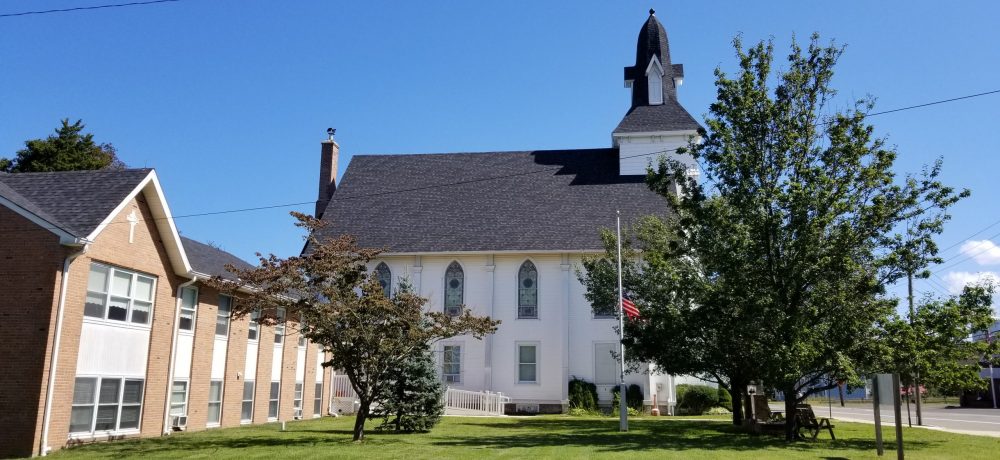Today Pastor Choi talks about God’s will in Christ for all God’s children: be thankful in all circumstances. He shares with the congregation three keys to thankfulness; thankfulness is a choice, thankfulness is a trust, thankfulness is an attitude of worship.
The following is a summary of the sermon:
The Old Man and the Horse [subtitle: three keys to thankfulness]
1 Thessalonians 5:18 New American Standard Bible (NASB)
18 in everything give thanks; for this is God’s will for you in Christ Jesus.
Introduction
Let me begin with a Chinese folk tale. It is called “The Horse of an Old Man in a Remote Village.”
Once upon a time there was an old man in a village in the northern Chinese border. He lived with his only son. He also owned a horse and one morning his horse was gone. The village people came to see if he was all right. They comforted him saying, “We are sorry that your horse is gone. It is a misfortune!”
The old man responded with little emotions saying, “Don’t be sorry for me. Who knows if this may turn into a blessing?’
Several months later, the horse came back. Not only had he returned, he also had brought a beautiful mare with him. Once again, the village people gathered around and said to the old man, “We are glad that your horse is back with another horse. Congratulations! What we thought a misfortune was a blessing!”
The old man replied as-a-matter-of-factly saying, “How do I know if this is a blessing or not? It may turn into a curse.”
Sure enough. His word came true a few days later. While the old man’s son tried to break the new horse, he fell from the horse and broke his legs. Once again the villagers comforted the old man saying, “We are sorry about what happened to your son. This new horse is a bad news!”
The old man spoke plainly. “Who knows if it is a blessing or a curse?”
A year passed and China was engaged in a war against a neighboring country. All the able men of the village went to the war and many of them died. Only the son of the old man was spared because of his injury.
The morale of the story is this: Do not jump to conclusions too quickly. No one is wise enough to know how things will turn out in the end. Only God knows.
Contents
Thanksgiving is just four days away. As we gather with our families and friends, let us not forget giving thanks to God for all the blessings.
A pop quiz for you: If you squeeze the entire population of the world down to 10 people, how many of them would actually remember to say “thank you” to you when you do something nice for them? The answer: only one (10%) [Both statistics and the Bible confirm it]. This is true when things are good. For bad things, very rarely people give thanks to you and to God [actually we tend to blame God for bad things, don’t we?]. But, God commands us to be thankful in all circumstances; both good and bad. That’s our topic this morning.
Before I dig deeper, let me read today’s text one more time to you: this time my own translation of the original Greek: in all circumstances and all the time be thankful; for this is God’s will for you in Christ Jesus. Some of us already think that it is impossible to be thankful in all circumstances. You’re right. In fact, with our own power, we can’t be thankful especially in adversities. I am here to remind you, though, that God never asks us to do something impossible. For the things that He asks us to be thankful, He also equips and enables us to do it. Being thankful in all circumstances is not only possible but also doable [but only in Christ Jesus (Philippians 4:13)]. I am going to share with you three keys to thankfulness in all circumstances.
First, thankfulness is a choice. It is not a feeling. We don’t thank God only when we feel like it. We don’t thank God only for good things, either. In fact, even the people who don’t know God can be grateful for the blessings. We, God’s children, are different. We choose to be thankful no matter what (why? Because it is God’s will). In the midst of all life’s situations, we choose not to go with our emotions but with our will. Don’t misunderstand here: when God commands us to be thankful, He doesn’t mean that we should be happy because bad things happened to us. No, He rather expects us to stay thankful to Him despite bad things and despite our bad feelings.
There are two words in English we interchangeably use to express our gratitude: ‘grateful’ and ‘thankful.’ Let me point out here that it was rather intentional when the Bible translators chose the word ‘thankful’ over ‘grateful’ in today’s text. In the Bible, ‘grateful’ is used for only good circumstances, while ‘thankful’ covers a greater territory and is used in both good and bad circumstances. For instance, we are grateful for a promotion at work. We are not grateful, however, when we are laid off. Let’s say we lost our jobs. We may not be happy; we may be far from grateful for the situation. However, God still wants us to be thankful. Remember: we are commanded to be thankful not just grateful. We choose to stay thankful. We choose to obey God’s will even when we don’t understand why bad things happen to us. Thankfulness is a choice.
Next, thankfulness is a trust. Without God, you can’t be thankful in all circumstances. Without trust in God, you can’t be thankful at all, either. Thankfulness begins with the understanding of who God is. God is all-powerful. He is everywhere. He knows everything. He is the author of time: He sees everything simultaneously; the beginning, the end, and everything in between. He is the only One who sees the entire picture of our lives. He knows when we were born. He sees when we are going to die. He sees everything in between. He sees the whole picture of our lives. That’s why we can trust in Him. That’s why we can rely on His wisdom. Remember the story of the old man and the horse? We humans pretend that we know all about our lives, yet the truth is that we don’t. We only see a piece here and a piece there. Without looking at the big picture, we make quick judgments on our situations (either good or bad) and we are bound to make mistakes. None of us knows how our life will turn out in the end. But, God does. Do you believe in God’s faithfulness and goodness? Then, trust in Him and put everything in His hands. Defer your judgments to God. He is the fairest of all. Trust in His good will that He will cause all things to work together for our good (Romans 8:28). Thankfulness is a trust.
Lastly, thankfulness is an attitude; the attitude of worship.
You may wonder: what does worship have anything to do with being thankful to God? How can worship help me to be thankful to God in all circumstances, especially in bad ones?
By the way, the worship I am talking about is more than Sunday morning worship services. Worship can take place, if we choose to, anytime and anywhere; we can worship God when we drive. We can worship God when we rake the leaves or even in the shower.
This is how it works: worship shifts our attention from us to God. In worship, we fix our eyes on God and His greatness, not on our problems. In worship, we remember who God is. We adore and praise His Holy name and invoke His help for our situations. In worship we remember who we are; we are God’s children and we call out to our Heavenly Father who cares about every need of ours. In worship, we encounter the God who is faithful to His children. In worship we remember God’s goodness and hold unto His promises, not unto our fears or anxieties.
Let me put it a different way. In worship, we don’t focus on the bad things happening to us. We focus on God, His greatness, His faithfulness, and His goodness. Worship helps us to look up to God and trust in Him who makes all things beautiful for those who love Him. Worship reminds us to trust in God’s ultimate good will for us. You see, we can be thankful to God only when we trust in Him who turns all the bad things into our good in due time.
Stay in constant spirit of worship of the Lord wherever you are and whenever it may be, and you will be able to be thankful. Thankfulness is an attitude of worship.
Conclusion
A well-loved hymn: It Is Well with My Soul—the words were written by Horatio Gates Spafford in 1873. Mr. Spafford was married and lived in Chicago with his family. He was “professor of medical jurisprudence of Lind University and he bought a great deal of real estate on the lake front. Then tragedy struck repeatedly. First, the Chicago fire of 1871 wiped out his real estate holdings. Then, in 1873, he planned a family vacation in Europe. Spafford sent his family ahead aboard the ship Ville du Havre. Out on the high seas, the Ville du Havre collided with the Lochearn and sunk. Mrs. Spafford was saved but their four daughters perished. Spafford took the next boat to meet his wife in Cardiff, Wales, where the survivors had been taken and while sailing past the spot where his daughters perished, wrote It is Well With My Soul. Their son also died an untimely death in 1880” (Charles Johnson, One hundred & One famous hymns, p. 144). He lost his five children in 7 years. [Hymnal #377] Verse 1: When peace like a river attendeth my way, when sorrows like sea billows roll; whatever my lot, thou hast taught me to say, It is well, it is well with my soul. It is well with my soul, it is well, it is well with my soul. I have no doubt that only his determination to trust in the Lord in the attitude of worship carried him through his life’s tragedies.
Anyone can be grateful for good things. Very few people in their own might can be thankful in adversities. However, God’s people are called to be thankful in all circumstances. In Christ and with God’s help, we can and will be thankful all the time in all circumstances. Thankfulness is a choice, it is a trust, and it is an attitude of worship.
Amen.

